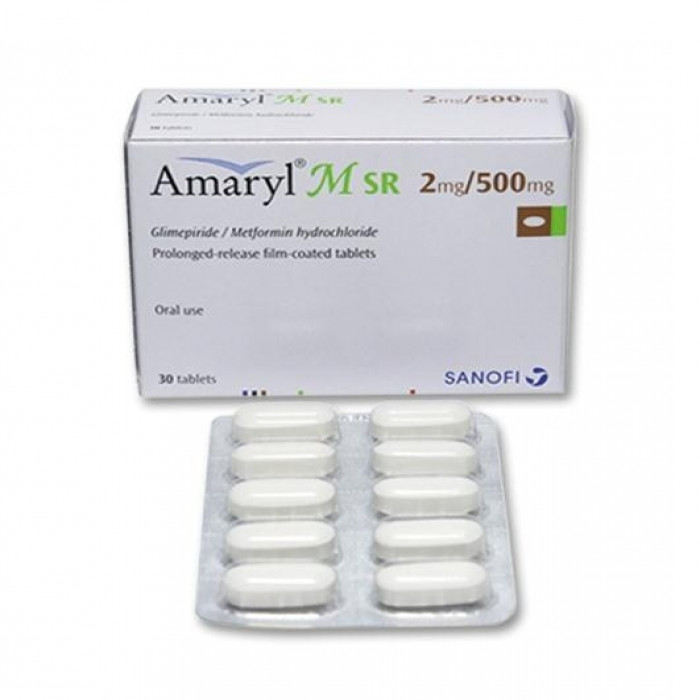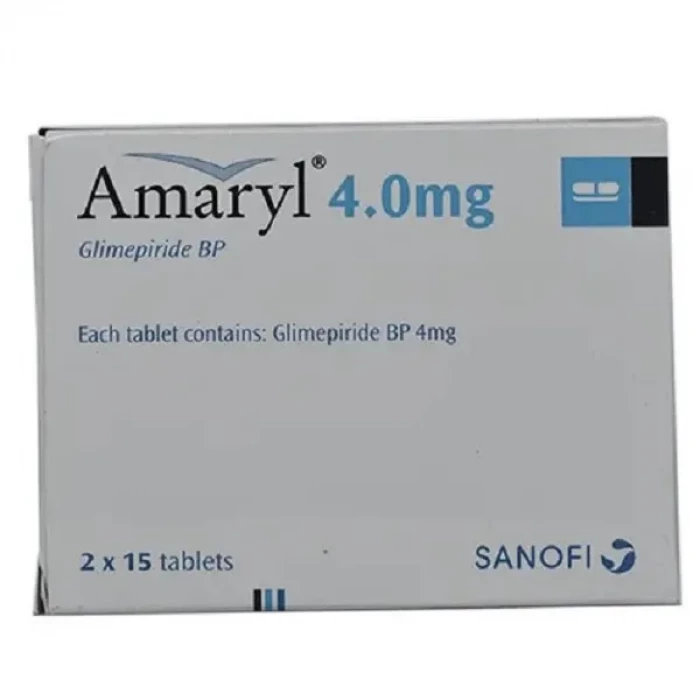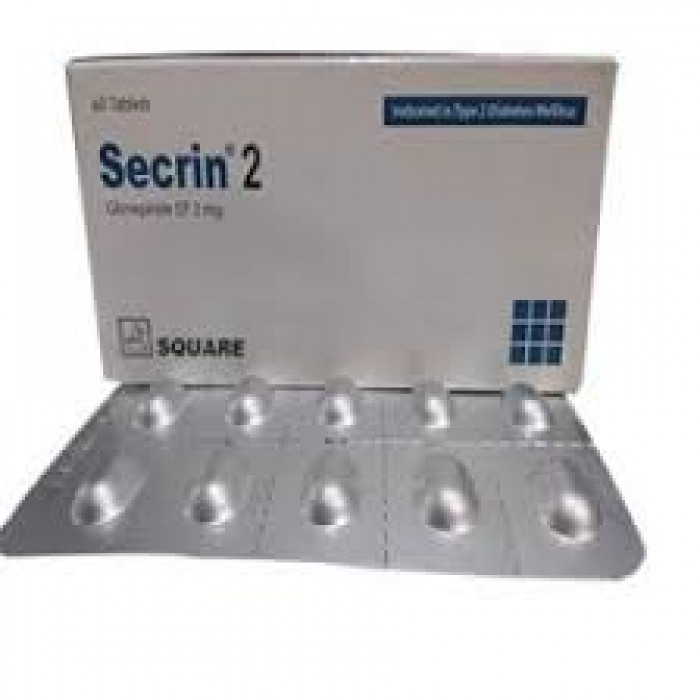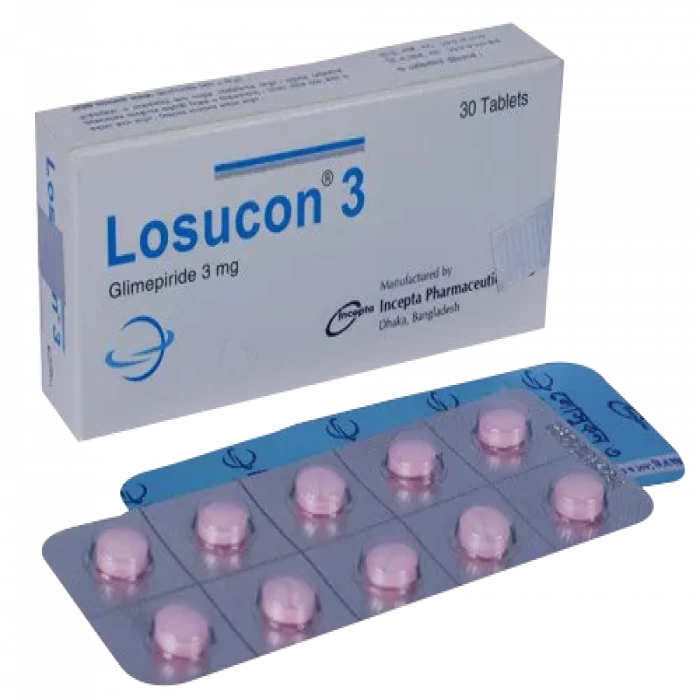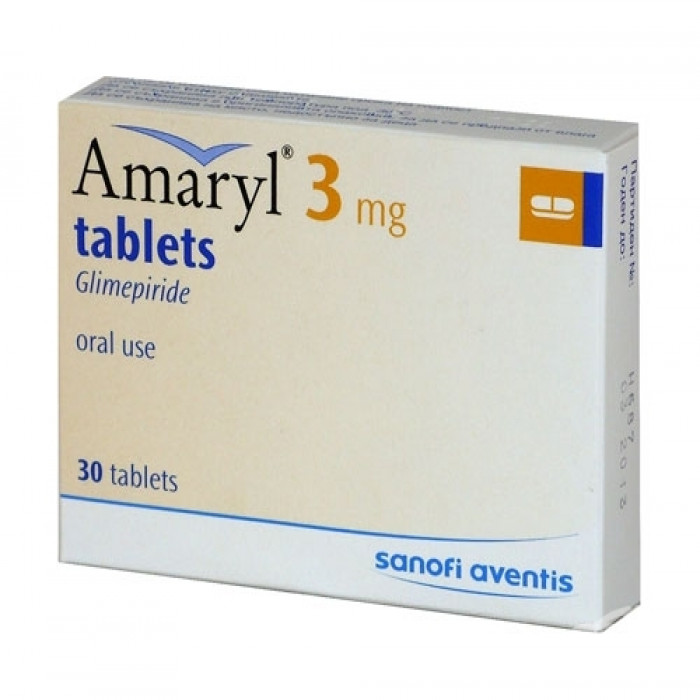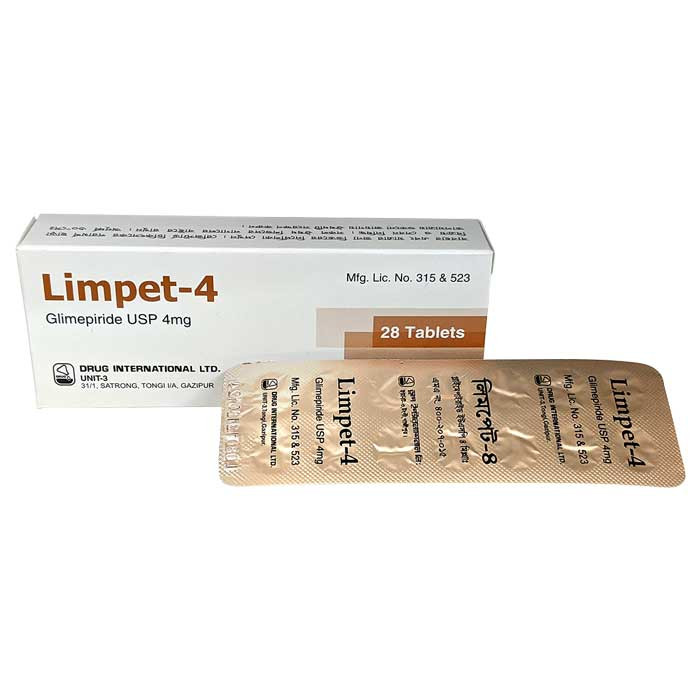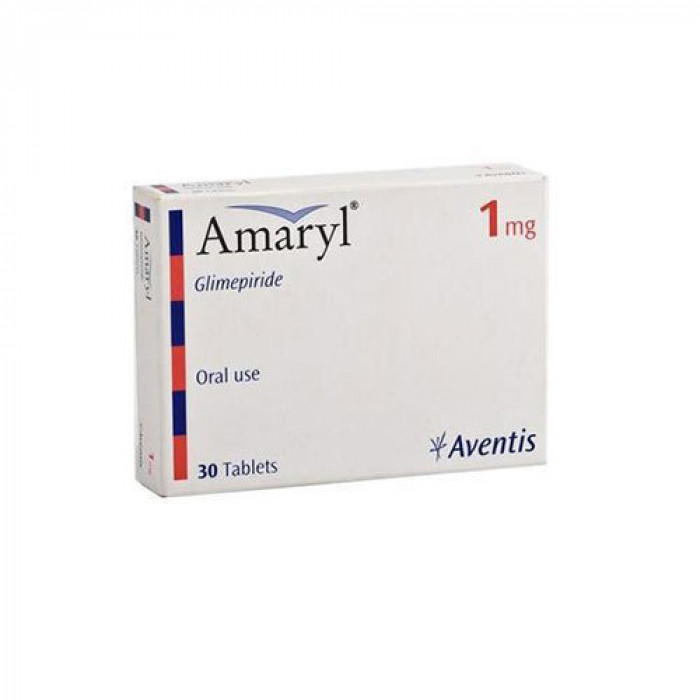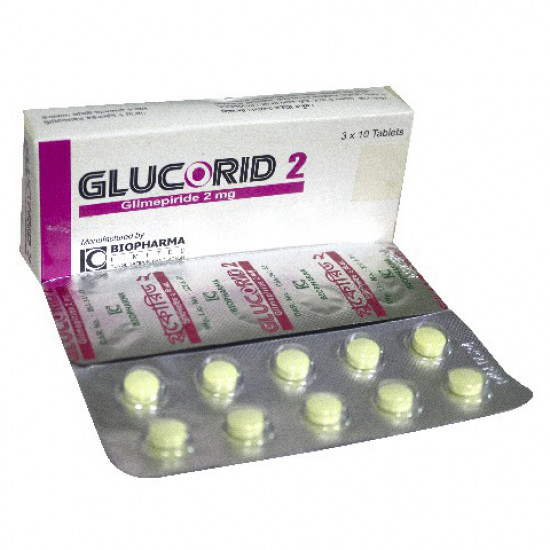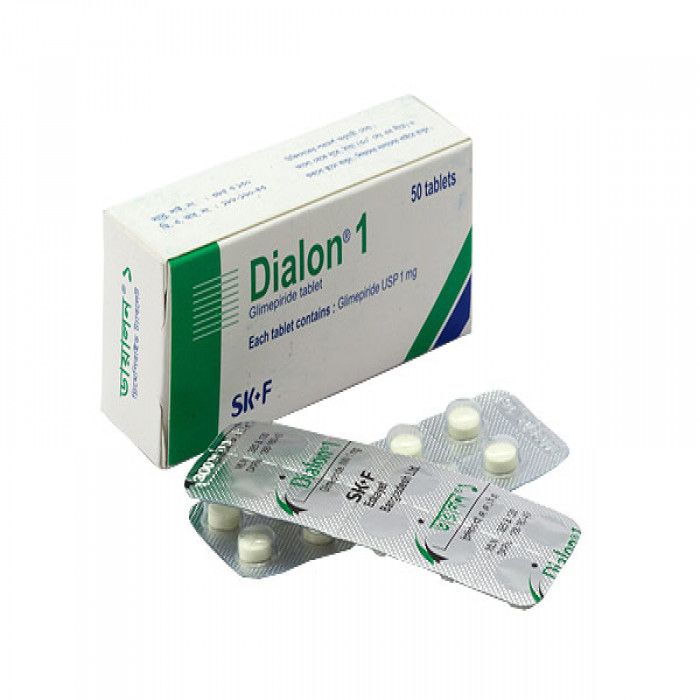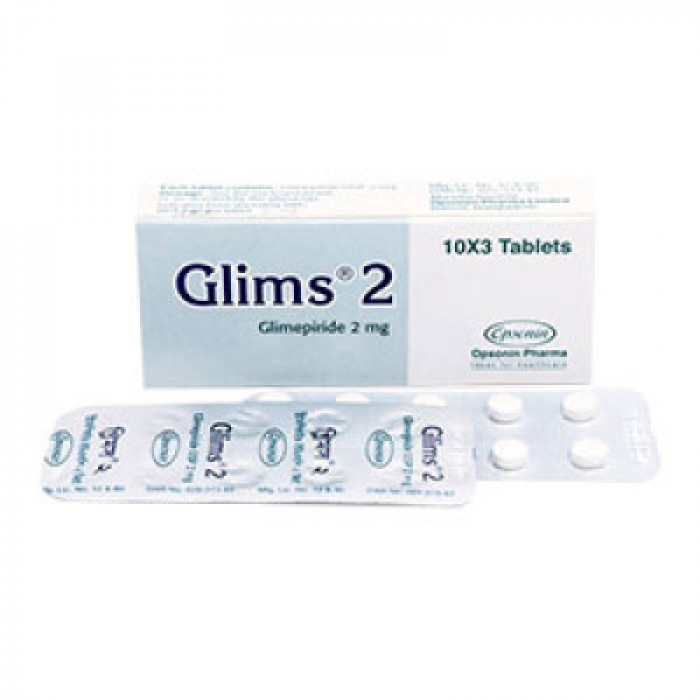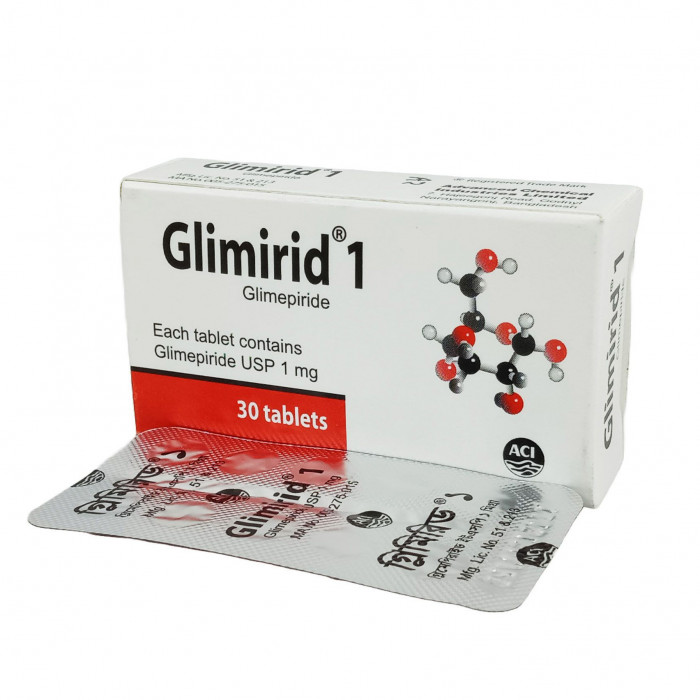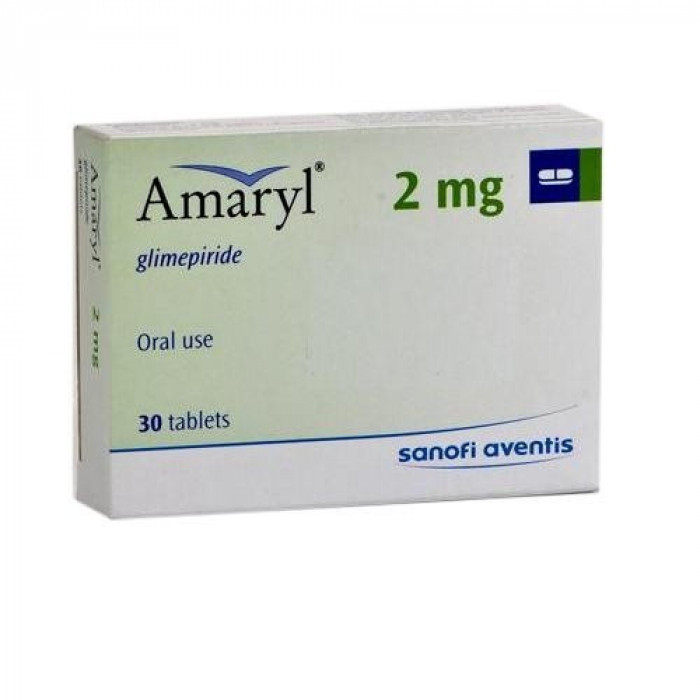
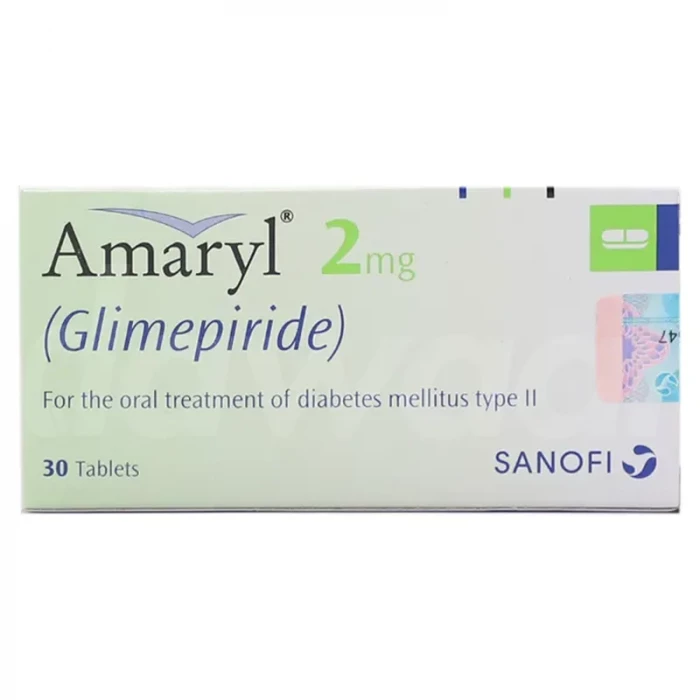
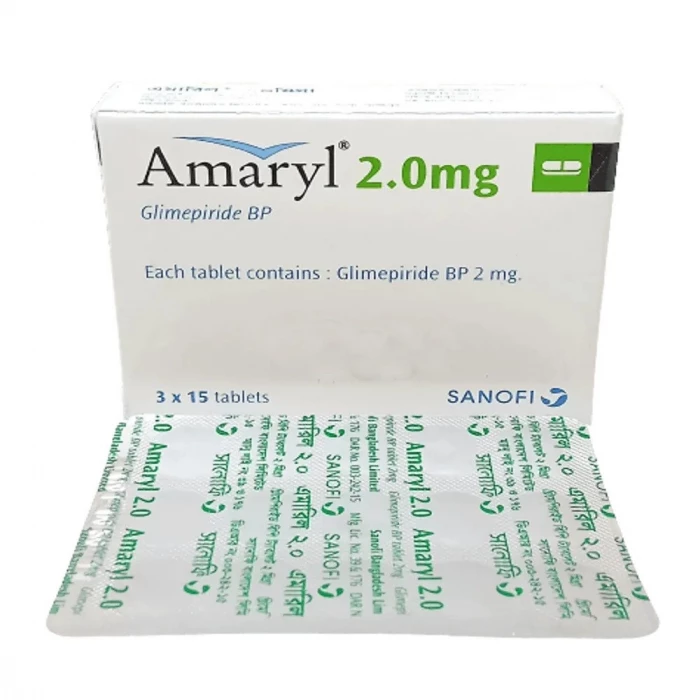
✔ 100% Authentic Product
👁️ Currently Viewing 2395
Glimepiride Tablet is an oral anti-diabetic medication designed to lower blood sugar levels. It's prescribed to manage Type II Diabetes in adults, aiding the body's processing of blood sugar. It can be used in combination with Insulin or other medications for improved blood sugar control. Amaryl 2mg Tablet increases insulin levels, effectively reducing blood sugar.
Discount
Price: ৳ 184
MRP:
৳
194.1
5%
Off

100% Genuine Products, Guaranteed

Safe & Secure Payments, Always

Fast, Secure & Efficient Delivery

Proper Packaging
 Cash on Delivery - All over Bangladesh
Cash on Delivery - All over Bangladesh Regular Delivery - 12-24 Hours, Dhaka City* Charge Tk.39-59
Regular Delivery - 12-24 Hours, Dhaka City* Charge Tk.39-59 Regular Delivery - 24-48 Hours, Other Cities* Charge Tk.99-110
Regular Delivery - 24-48 Hours, Other Cities* Charge Tk.99-110
 ফ্রি ডেলিভারিঃ - ৯৯৯ টাকা+ অর্ডারে, ঢাকা
শহরে
ফ্রি ডেলিভারিঃ - ৯৯৯ টাকা+ অর্ডারে, ঢাকা
শহরে ফ্রি ডেলিভারিঃ - ২৯৯৯ টাকা+ অর্ডারে, ঢাকার
বাহিরে
ফ্রি ডেলিভারিঃ - ২৯৯৯ টাকা+ অর্ডারে, ঢাকার
বাহিরে
100% Genuine Products, Guaranteed
Safe & Secure Payments, Always
Fast, Secure & Efficient Delivery
Proper Packaging
 Cash on Delivery - All over Bangladesh
Cash on Delivery - All over Bangladesh Regular Delivery - 12-24 Hours, Dhaka City* Charge Tk.39-59
Regular Delivery - 12-24 Hours, Dhaka City* Charge Tk.39-59 Regular Delivery - 24-48 Hours, Other Cities* Charge Tk.99-110
Regular Delivery - 24-48 Hours, Other Cities* Charge Tk.99-110 ফ্রি ডেলিভারিঃ - ৯৯৯ টাকা+ অর্ডারে, ঢাকা
শহরে
ফ্রি ডেলিভারিঃ - ৯৯৯ টাকা+ অর্ডারে, ঢাকা
শহরে ফ্রি ডেলিভারিঃ - ২৯৯৯ টাকা+ অর্ডারে, ঢাকার
বাহিরে
ফ্রি ডেলিভারিঃ - ২৯৯৯ টাকা+ অর্ডারে, ঢাকার
বাহিরে
✅ Description:
Amaryl 2mg Tablet contains Glimepiride, an Anti-diabetic agent. It's used for Type II diabetes when diet and exercise don't adequately control blood sugar.
This chronic condition stems from insufficient insulin (controls glucose metabolism) or reduced cell response to it. Lifestyle changes like healthy eating, exercise, and abstaining from alcohol are often recommended alongside therapy.
Before using Amaryl 2mg Tablet, tell your doctor about liver/kidney problems, hormonal/genetic issues, or malnutrition. Not for Type I diabetes. Consult if pregnant, breastfeeding, or planning to be.
Safety Advices

Alcohol
UNSAFE
Consumption of alcohol is unsafe to be taken along with this medication.

Pregnancy
CONSULT YOUR DOCTOR
Amaryl 2mg Tablet should not be used during pregnancy. Inform your doctor if you are pregnant, think you may be pregnant, or planning to have a baby, your doctor may switch to insulin therapy.

Breastfeeding
CONSULT YOUR DOCTOR
Amaryl 2mg Tablet is not recommended for women who are breastfeeding due to a risk of severe adverse effects on the infant.

Driving
CAUTION
Amaryl 2mg Tablet can affect the consciousness and alertness of the patient and driving must be avoided after taking it.

Kidney
CONSULT YOUR DOCTOR
Dose adjustment is needed in patients with renal impairment. Kindly consult your doctor before taking this medicine.

Liver
CONSULT YOUR DOCTOR
Caution must be taken in patients with liver disease. Adjustment of dose might be needed. Kindly consult your doctor before taking this medication.
✔️ Uses of Amaryl 2mg Tablet
- Type II Diabetes Mellitus
✔️ How does Amaryl 2mg Tablet work?
Amaryl 3mg Tablet increases insulin secretion from the pancreas and regulates glucose release from the liver.
✔️ Side Effects of Amaryl 2mg Tablet
Common side effects of Amaryl 2mg Tablet include hypoglycemia (low blood sugar levels). Rare side effects may include a decrease in RBC, WBC, platelet count, taste changes, weight gain, and hair loss.
In case you experience any of the following severe side effects, stop taking Amaryl 2mg Tablet and seek medical attention immediately:
- Severe allergic reaction (including swelling of the face, eyelids, lips, tongue, or throat; difficulty breathing or swallowing; drop in blood pressure; shock)
- Signs of liver problems (fever, yellowing of skin and eyes, weakness, fatigue, weight loss, loss of appetite)
- Increased skin sensitivity to the sun
- Severe decrease in blood sugar level symptoms (confusion, excessive sweating, clammy skin, trembling, weakness, double vision, excessive hunger, nausea, vomiting, sleep problems, agitation, inability to concentrate, drowsiness, loss of consciousness, slowed reactions, depression, trouble seeing or speaking, paralysis, numbness, dizziness, hallucinations, difficulty breathing, chest pain with slowed or faster heartbeat)
If you experience any of these symptoms, seek immediate medical attention.
✔️ Quick Suggestions:
- Amaryl 2mg Tablet is an anti-diabetic medication containing glimepiride, used to manage type 2 diabetes by reducing blood sugar levels.
- Consistency is key; take it at the same time daily for optimal effects. Alongside, adopt healthy habits like exercise, avoiding smoking and alcohol, and maintaining a balanced diet rich in fruits and vegetables.
- Regular blood sugar monitoring is important. Prior to starting, inform your doctor about pregnancy, breastfeeding, and your medical history.
- Some may experience weight gain, low blood sugar, hunger, dizziness, or nausea/vomiting. Report persistent effects to your doctor.
- Be cautious if drowsy, unconscious, or confused after taking Amaryl 2mg Tablet, avoiding tasks like driving or operating machinery. Consult your doctor if you have kidney or liver disease.
- Missed a dose? Take it when remembered; if close to the next dose, skip it and continue as usual.
✔️ Indication
Glimepiride is used in the treatment of type 2 diabetes mellitus. It is used along with diet and exercise to improve blood sugar control in adults with type 2 diabetes.
✔️ Pharmacology
Glimepiride stimulates the insulin release from pancreatic beta-cells and reduces glucose output from the liver. It also increases insulin sensitivity at peripheral target sites.
✔️ Dosage & Administration of
The dosage of Glimepiride is determined based on the target blood sugar level. It should be the lowest effective dose to achieve desired metabolic control. Initial and maintenance doses depend on regular glucose monitoring. The usual starting dose is 1 mg daily, which can be increased gradually every 1-2 weeks based on blood sugar readings: 1 mg, 2 mg, 3 mg, 4 mg, and 6 mg. The typical range for well-controlled diabetes is 1 to 4 mg daily. A single daily dose is usually sufficient, taken before a substantial breakfast or the first main meal. Skipping meals after taking the medication should be avoided.
As diabetes control improves, sensitivity to insulin increases, potentially leading to reduced Glimepiride requirement. Adjustments in dose or cessation must be considered to prevent hypoglycemia. Changes in weight, lifestyle, or other factors should trigger dose adjustments. Transitioning from other oral antidiabetics to Glimepiride requires an initial 1 mg dose, regardless of the previous agent's maximum dose. Dose increases should follow the aforementioned guideline. Interruption of treatment may be necessary to avoid additive effects and hypoglycemic risk.
✔️ Interaction
Salicylates, sulfonamides, chloramphenicol, clarithromycin, coumarin anticoagulants, probenecid, CYP2C9 inhibitors, fibric acid derivatives, disopyramide, fluoxetine, quinolones, ACE inhibitors, MAOIs, and β-blockers can enhance the hypoglycemic effect of glimepiride. On the other hand, thiazides, other diuretics, corticosteroids, phenothiazines, thyroid products, estrogens, phenytoin, nicotinic acid, sympathomimetics, and CYP2C9 inducers may diminish the hypoglycemic impact of glimepiride. Glimepiride's plasma concentration can be reduced when taken with colesevelam.
✔️ Contraindications
Do not use Amaryl 2mg Tablets if you are allergic to Glimepiride, Sulfonylureas, Sulfonamides, or any of its ingredients. It is also not suitable for individuals with type 1 diabetes, signs of diabetic ketoacidosis (such as fatigue, nausea, frequent urination, and muscle stiffness), and severe kidney or liver disease.
✔️ Precautions & Warnings
Before taking Amaryl 2mg Tablet, inform your doctor if you are recovering from an injury, undergoing surgery, or experiencing fever, infections, or stress. Your doctor may need to adjust your care temporarily. If you have serious kidney or liver disease, are breastfeeding, or are pregnant, consult your doctor before using Amaryl 2mg Tablet. Avoid this medication if you are allergic to sulfa drugs, glimepiride, or other antidiabetic medicines, or if you have glucose 6-phosphate dehydrogenase (G6PD) deficiency. Patients with heart disease should consult a doctor before using Amaryl 2mg Tablet, as it may impact their heart condition. Avoid taking Amaryl 2mg Tablet with oral contraceptives, as it might raise blood sugar levels. Conversely, taking it with painkillers like aspirin or ibuprofen can lower blood sugar.
✔️ Storage Conditions
This drug should be kept in a cool dry place and in its original pack. Make sure this medication remains unreachable to children and pets.
⚠️Disclaimer:
At ePharma, we’re committed to providing accurate and accessible health information. However, all content is intended for informational purposes only and should not replace medical advice from a qualified physician. Please consult your healthcare provider for personalized guidance. We aim to support, not substitute, the doctor-patient relationship.




